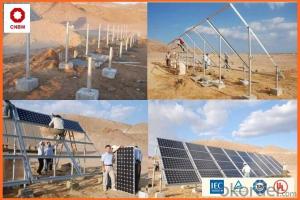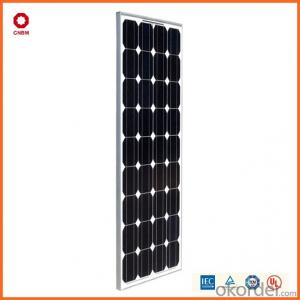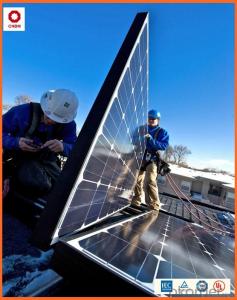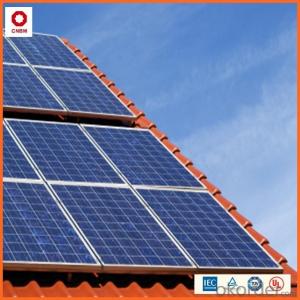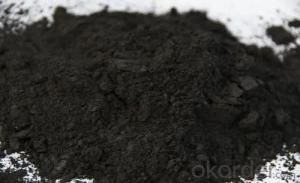85w Small Solar Panels in Stock China Manufacturer
- Loading Port:
- China main port
- Payment Terms:
- TT OR LC
- Min Order Qty:
- 1 watt
- Supply Capability:
- 10000000 watt/month
OKorder Service Pledge
OKorder Financial Service
You Might Also Like
Item specifice
Product Description:
Hot Sale !!! Quality and Safety of Small Poly Solar Panel 5w~150w
1. Rigorous quality control meets the highest international standards.
2. High-transmissivity low-iron tempered glass, strong aluminium frame.
3. Using UV-resistant silicon.
4. IS09001/14001/CE/TUV/UL
Warranties of Small Poly Solar Panel 35~85w
1. 10 years limited product warranty
2. 15 years at 90% of the minimal rated power output
3. 25 years at 80% of the minimal rated power output
Specification
Characteristics of Poly solar panels CNBM (245-320W) | |||||
Max Power Voltage Vmp(V) | 30.3 | 30.8 | 31.1 | 31.4 | 31.85 |
Max Power Current Imp(A) | 7.60 | 7.64 | 7.73 | 7.81 | 7.85 |
Open Circuit Voltage Voc(V) | 36.1 | 36.6 | 37 | 37.3 | 37.68 |
Short Circuit Current Isc(A) | 8.50 | 8.55 | 8.65 | 8.75 | 8.85 |
Max Power Pm(W) | 230W | 235W | 240W | 245W | 250W |
Temperature Coefficient of Cells Poly solar panels CNBM (245-320W) | |
NOCT | 45± 2 |
Temperature Coeffucients of Isc | 0.0492 |
Temperature Coeffucients of Voc | -0.3374 |
Temperature Coeffucients of Voc | -0.4677 |
Mechanical Data of Poly solar panels CNBM (245-320W) | |
Dimension | 1638 × 982 × 40 mm |
Weight | 19.5 kg |
No. of Cells and Connections | 60 (6 ×10) |
Tolerance | 0 ~ + 5 W |
Cell | Monocrystalline Cell 156 × 156 mm |
Packing | 624 Pcs/40ft(H) Container |
Limits of Poly solar panels CNBM (245-320W) | |
Operating Temperature | -40 to +85 |
Storage Temperature | -40 to +85 |
Max System Voltage | 1000VDC(IEC) / 600VDC(UL) |
Features of our products:
• High conversion efficiency mono/poly-crystalline amorphous silicon solar cells
• Modules incorporate high performance bypass diodes to minimize the power drop caused by shading
• High transmittance, low-iron tempered glass
• High performance EVA encapsulant to prevent destroying and water.
• AI frame: without screw, corner connection. 8 holes on the frame can be installed easily
• Good performance of preventing from atrocious weather such as wind and hails
• Certifications: CE IEC TUV VDE UL, Class I
• 10 years 90% power output warranty

Shipping of Small Poly Solar Panel 35~85w
By Sea | Delivery from Shanghai or Ningbo seaport |
By Air | Departure from Shanghai Pudong Airport |
By Express | Post by DHL, EMS, UPS, TNT. |
Features of our products:
• High conversion efficiency mono/poly-crystalline amorphous silicon solar cells
• Modules incorporate high performance bypass diodes to minimize the power drop caused by shading
• High transmittance, low-iron tempered glass
• High performance EVA encapsulant to prevent destroying and water.
• AI frame: without screw, corner connection. 8 holes on the frame can be installed easily
• Good performance of preventing from atrocious weather such as wind and hails
• Certifications: CE IEC TUV VDE UL, Class I
• 10 years 90% power output warranty
As a professional Solar Panel manufacturer and Supplier in China, we have our customers come around the whole world and our specialization has got a worldwide recognition. Meanwhile, with our superior quality, competitive price, prompt and excellent service, As main role in trade section of CNBM Group, CNBM International Corporation supplies products including Monocrystalline Solar Panel, Polycrystalline Solar Panel ( multicrystalline silicon Solar Panel) have received and enjoyed famous reputation in many countries and regions in the world.
- Q:What is the role of disconnect switches in a solar energy system?
- The safe isolation of a solar energy system from the grid or other power sources is made possible by disconnect switches, which play a crucial role. During maintenance, repairs, or emergencies, these switches act as a safeguard by allowing the complete disconnection of solar panels or inverters from the electrical grid. A key function of disconnect switches is to protect both the system and the individuals involved in its operation. By preventing the flow of electricity from the solar panels to the grid, they ensure that no power is being generated or transferred during maintenance or repairs. This helps minimize the risk of electric shocks or accidents. In addition, disconnect switches help meet safety regulations and codes. They enable easy and quick disconnection of the solar energy system, which is often required during inspections or in the event of emergencies such as fires or natural disasters. By isolating the system, these switches help prevent any potential damage to the system or the grid. Furthermore, disconnect switches allow for efficient monitoring and control of the solar energy system. They provide a convenient way to shut down the system when necessary, facilitating troubleshooting or routine checks. By disconnecting the solar panels, inverters, or battery storage systems, these switches optimize the overall system's efficiency and performance. In conclusion, disconnect switches in a solar energy system ensure the safety of individuals involved, comply with safety regulations, protect the system and the grid from damage, and enable efficient monitoring and control. As an essential component, these switches enable the safe and effective operation of solar energy systems.
- Q:Can solar energy systems be used in powering airports or transportation hubs?
- Yes, solar energy systems can be used to power airports or transportation hubs. In fact, many airports around the world are already using solar energy to offset their energy consumption and reduce their carbon footprint. Solar panels can be installed on rooftops, parking lots, or unused land at airports to generate electricity that can be used to power various operations, such as lighting, heating, cooling, and even charging electric vehicles. This helps airports become more sustainable and reduce their dependence on fossil fuels.
- Q:Can solar energy systems be used for powering food processing or packaging plants?
- Yes, solar energy systems can be used effectively for powering food processing or packaging plants. Solar panels can be installed on the rooftops or nearby open spaces of these facilities to harness the sun's energy. This renewable energy source can provide a significant portion or even the entire power required for the operations of these plants, reducing their reliance on conventional energy sources. Moreover, solar energy systems can also help these plants in achieving sustainability goals by reducing carbon emissions and lowering operational costs in the long run.
- Q:How does the efficiency of solar panels vary across different manufacturers?
- The efficiency of solar panels can indeed vary across different manufacturers. There are several factors that contribute to this variation. Firstly, the quality and type of materials used in the production of solar panels can greatly impact their efficiency. Manufacturers may use different types of silicon, such as monocrystalline or polycrystalline, which have varying degrees of efficiency. Monocrystalline silicon panels tend to have higher efficiency rates compared to polycrystalline ones. Secondly, the manufacturing processes employed by different companies can affect the efficiency of their solar panels. Some manufacturers may have more advanced and precise techniques, allowing them to produce panels with higher efficiency. This includes factors such as the thickness of the silicon layers, the quality of anti-reflective coatings, and the precision of cell alignment. Thirdly, research and development efforts play a significant role in improving the efficiency of solar panels. Some manufacturers invest heavily in research to develop new technologies and techniques that enhance panel efficiency. This can result in more efficient solar cells and improved overall panel performance. Moreover, product design and engineering also contribute to the efficiency variation among different manufacturers. Some companies may focus on optimizing the panel design for maximum light absorption and reduced energy losses, leading to higher efficiency. This includes factors such as the number and arrangement of cells, the size and spacing of busbars, and the integration of bypass diodes. Additionally, the level of quality control and testing procedures implemented by manufacturers can impact panel efficiency. Companies that have stringent quality control measures and comprehensive testing protocols are more likely to produce panels with higher efficiency rates, as they can identify and minimize any defects or issues during the production process. Lastly, it is worth noting that the efficiency of solar panels is also influenced by external factors such as temperature, shading, and orientation. Different manufacturers may have varying levels of tolerance to these external factors, resulting in different performance levels under real-world conditions. Overall, the efficiency of solar panels can vary across different manufacturers due to factors such as material quality, manufacturing processes, research and development efforts, product design, quality control, and external factors. It is important for consumers to consider these factors when comparing solar panels from different manufacturers to ensure they choose the most efficient option for their specific needs.
- Q:Can solar panels be used to power agricultural irrigation systems?
- Yes, solar panels can be used to power agricultural irrigation systems. Solar energy can be harnessed and converted into electricity to power water pumps and other irrigation equipment, providing a sustainable and reliable source of power for agriculture. This helps reduce reliance on traditional energy sources and contributes to more environmentally friendly farming practices.
- Q:Are there any risks of electrical malfunction or failure with solar energy systems?
- Solar energy systems come with certain risks of electrical malfunction or failure. One of the primary concerns revolves around faulty or damaged electrical connections, which can cause a loss of power generation or even spark electrical fires. Moreover, extreme weather conditions like lightning strikes or strong winds have the potential to harm solar panels or inverters, resulting in either temporary or permanent system failure. Another issue lies in the gradual degradation of solar panels over time, leading to reduced efficiency and eventual replacement. Furthermore, inadequate installation or maintenance practices may contribute to system failure or electrical malfunctions. To mitigate these risks, it is crucial to have solar energy systems installed by qualified professionals and ensure regular inspections and maintenance are conducted.
- Q:Are solar energy systems suitable for commercial buildings?
- Yes, solar energy systems are suitable for commercial buildings. They offer numerous benefits such as cost savings on electricity bills, reduced carbon footprint, and potential tax incentives. Additionally, the availability of ample rooftop space in many commercial buildings makes it easier to install solar panels.
- Q:Can solar energy systems be used for powering electric vehicle charging infrastructure?
- Yes, solar energy systems can be used to power electric vehicle charging infrastructure. Solar panels can be installed to generate electricity from the sun, which can then be used to charge electric vehicles. This renewable energy source is a sustainable and environmentally-friendly option for powering electric vehicle charging stations.
- Q:Can solar energy systems be used for powering off-grid sustainable communities?
- Yes, solar energy systems can be used to power off-grid sustainable communities. Solar panels can generate electricity from the sun's rays, providing a reliable and renewable energy source. This can be harnessed to power various appliances, lighting, heating, and cooling systems in off-grid communities. By utilizing solar energy, these communities can reduce their dependence on fossil fuels and contribute to a more sustainable and environmentally friendly lifestyle.
- Q:Can a solar energy system be installed on a library or educational institution?
- Yes, a solar energy system can be installed on a library or educational institution. In fact, many libraries and educational institutions have already embraced solar energy systems as a sustainable and cost-effective way to meet their energy needs. Installing solar panels on rooftops or in nearby areas can generate clean and renewable electricity, reducing carbon emissions and saving on energy costs. Additionally, educational institutions can use these solar installations as an educational tool to teach students about renewable energy and sustainability.
1. Manufacturer Overview |
|
|---|---|
| Location | |
| Year Established | |
| Annual Output Value | |
| Main Markets | |
| Company Certifications | |
2. Manufacturer Certificates |
|
|---|---|
| a) Certification Name | |
| Range | |
| Reference | |
| Validity Period | |
3. Manufacturer Capability |
|
|---|---|
| a)Trade Capacity | |
| Nearest Port | |
| Export Percentage | |
| No.of Employees in Trade Department | |
| Language Spoken: | |
| b)Factory Information | |
| Factory Size: | |
| No. of Production Lines | |
| Contract Manufacturing | |
| Product Price Range | |
Send your message to us
85w Small Solar Panels in Stock China Manufacturer
- Loading Port:
- China main port
- Payment Terms:
- TT OR LC
- Min Order Qty:
- 1 watt
- Supply Capability:
- 10000000 watt/month
OKorder Service Pledge
OKorder Financial Service
Similar products
New products
Hot products
Hot Searches
Related keywords
